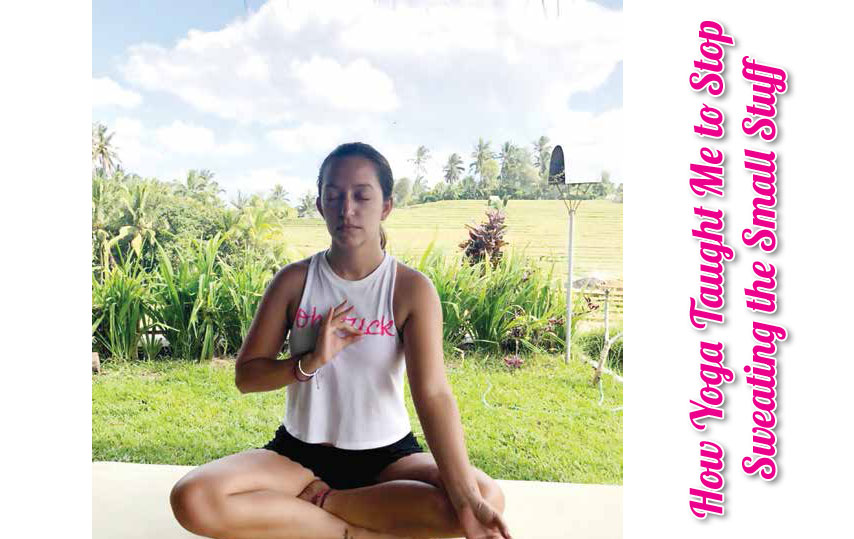Those who have never practiced yoga before have an image of yogis as mellow, extra-flexible hippies. While you don’t need to be flexible to practice yoga, most people benefit from a more “mellow” state of mind after practicing yoga.
In my opinion, this is the best benefit of practicing yoga – the positive effect on your mind. Everyone can learn to cultivate a more peaceful mind and stop sweating the small stuff.
What Classifies as Doing Yoga?
Doing yoga poses – asanas – is actually only one of 8 “limbs,” or components, of yoga. This was one of the most life-changing facts I learned during my yoga teacher training. Interestingly, “asana” in Sanskrit literally means “seat.” So the first gonfiabili yoga pose ever was simply taking a seat, the posture used to meditate. Meditation plays a heavy role in the 8 limbs of yoga, as well as personal and external ethics. “Asteya,” which means nonstealing, is one that resonates with me most since it literally means not stealing from others but also not taking what doesn’t belong to you – for example, striving to do a yoga pose your body isn’t ready for yet. The 8 limbs of yoga are basically guiding principles for living your life that anyone can follow.

How Do I Meditate?
Most people are able to achieve a more peaceful state of mind through a physical yoga practice but also through meditation. Many people have the misconception that meditation means to empty your mind of thoughts. In fact, meditation is the practice of regulating your thoughts, not getting rid of them. In meditation, you bring attention to a focal point – often your breath – and try your best to focus on it. When your mind wanders, you acknowledge the thought without judgment or emotion attached, recognize it as just a thought, and release that thought and come back to your focus point. Try to meditate this way starting with just 5-10 minutes a day and you may be surprised at the effects!
How Does Yoga Make Me More Peaceful?
In a physical yoga practice and in meditation, you are compelled to focus on the present moment. In a physical practice, the challenge of holding the postures compels you to focus on how your body feels and be amazed at what your body can do. In meditation, you focus on your breath and also the world around you – if you are meditating outside, you can focus on the feeling of the wind on your skin, the sound of a tree’s leaves rustling in the wind, and more. This focus on yourself and your connection to the world is often called being mindful.

How Does Yoga Make Me More Mindful?
I have found that the body and mind awareness I have learned in yoga seeps into my everyday life. For example, the other day I got a facial. I had been running around all day doing errands and when I finally slowed down and laid on the spa table I realized how stressed I was. My heart rate was quite elevated – I didn’t know I was so stressed, but my body was telling me. I acknowledged this feeling, was curious about it, and consciously tried to calm myself down.
Yoga helps us become aware of our “shadow” qualities – the darker qualities in ourselves that are buried below the surface. My yoga teacher always told us that it is important to explore the “dark” side of our being and do the inner work to overcome these faults or learn to simply appreciate them and live with them.

We often hold tension in specific areas of our bodies, and we can do asana to release this tension. Certain asana such as hip openers can trigger an emotional release that you may want to explore. Sometimes you may feel sad for no reason – really examine that and see if you can trace it back to a specific event.
How Does Yoga Help Me Stop Sweating the Small Stuff?
Mindfulness plays a big role in learning to stop sweating the small stuff. If a stressful event occurs, such as a fight with a loved one, you are able to take a step back and see the situation from a more holistic perspective. You are able to see yourself and your loved one as simply two humans, not that different from each other. You realize that your disagreement will not matter a week from now, it will be but a blip in the entirety of your life. I’m not claiming yoga will help you get rid of ALL fighting – I still fight a lot with my sister – but it helps reduce the frequency of fights, for sure!
I find myself calmer in stressful situations, especially when I am traveling. Recently our car broke down in Madagascar and instead of being stressed and angry, I knew that this was just a momentary setback on our trip and we would find a way to continue. Actually, it led to us making friends with other travelers who let us hitchhike with them back to the town. We shared beers that night and had a really nice conversation. You could say that our car breaking down actually was a good thing!

How does yoga help me take re sponsibi lity for my own actions?
Oftentimes we get angry about things that are beyond our control – a canceled flight, a surly airline agent. Yoga helped me understand that I am the only one who can change my actions and behavior. What if I simply accepted that my flight was canceled and didn’t let it ruin my trip? We have the power to change our reactions to “negative” situations.
For me, it was difficult to understand that I couldn’t control what other people do – as funny as that sounds! When my dad passed, I saw that my sisters were suffering, so I urged them to go to therapy. Therapy was helping me so I thought it was a no-brainer for them to do it too. However, they refused and said they had their own ways of coping.
I didn’t understand why they wouldn’t do something that had helped me so much, but I had to accept that they had to make their own decisions for their well-being. I learned that even if you have good intentions, you can’t force people to do something, even if it’s “good” for them. Still, if you show up to your interactions with others with a positive energy, it will likely influence them as well.

How does yoga help me become more grateful?
Lastly, another great benefit of practicing yoga is gratitude. In a physical practice, you are grateful for all of the amazing things your body can do. In meditation, you are grateful for your mind’s ability to focus, and you appreciate the world around you. I find that my gratitude extends outside my yoga practice and seeps into my everyday life. I am able to appreciate small moments and interactions with others, whether they are a stranger or a friend or family member. They say that gratitude is one of the keys to happiness – appreciating what you have. We could all use more of that!

You can follow Roxanne at Instagram.com/rox_on_the_road.
ABOUT THE AUTHOR: Roxanne is a 200-hour RYT with a passion for traveling the world. She has been to over 35 countries and loves to explore the culture of each place she visits. From traveling to some of the world’s poorest countries, including India, Madagascar, and Haiti, she was amazed to find that people seemed to be happier than those in the U.S., despite having few material possessions. They seemed to derive their happiness instead from living life to the fullest and developing strong relationships. Roxanne has since adopted a more minimalist lifestyle focusing on experiences rather than things and gives back to her community by teaching yoga.

















 Other
Other